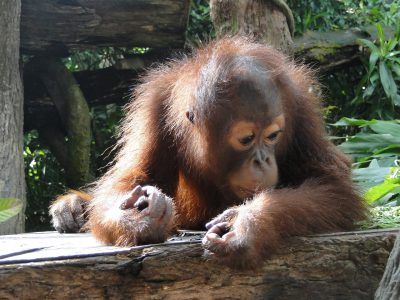Look up whilst walking through the forests of Sumatra and Borneo and you may be just lucky enough to spot one of our closest relatives swinging through the trees – the orangutan. The word itself comes from the Malay words orang hutan, meaning ‘human of the forest’ – quite fitting given that we share 97% of our DNA with these gorgeous, orange-furred animals.
There are two species of orangutan, the Bornean and Sumatran, that live in the forests of Malaysia and Indonesia. Orangutans spend most of their time in the trees, even making their nests of leaves high up in the branches. They are mostly solitary and feed on a mix of fruits, shoots, leaves, bark and insects.
Unfortunately, however, orangutans are critically endangered, at risk of extinction, and mostly because of the palm oil industry.
The problem with palm oil

Palm oil is derived from the fruit of the oil palm tree and it is everywhere. You may not notice it, but guaranteed you are using or consuming it on a daily basis. It is in our foods, our soap and toiletries, our makeup, our cleaning products and even in biodiesel.
But, what’s the problem? Well, the growing demand is putting increasing pressure on the industry to produce more and more. Oil palms grow in tropical countries like Indonesia and Malaysia, and to up the production, natural forests are being destroyed. This is impacting a variety of animals, but orangutans are one of the hardest hit. These forests are their home and they are disappearing, and consequently so are orangutans.
Orangutans rely on the forest and trees for survival so cannot get what they need from oil palm plantations. The loss of habitat is leaving orangutans without food or shelter and is pushing them closer to humans, who are also known to hunt and kill them. Orangutans are slow to reproduce as well. Females won’t produce young until they are 10–15 years old and then they will give birth to one baby, at most every five years. Big losses in a population, therefore have a huge impact on numbers; recovery is slow.
What is being done to help orangutans?

Where possible, displaced orangutans are relocated to other areas, but this is becoming difficult as forest cover is so low and patchy, that there are few places to rehome them. Rescue centres also take in and rehabilitate malnourished or sick orangutans.
In 2004, the Roundtable on Sustainable Palm Oil (RSPO) was set-up to promote and encourage the use of sustainable palm oil. They have produced a set of criteria that must be met in order for a company to state they produce Certified Sustainable Palm Oil (CSPO). They ensure that negative impacts of palm oil production are reduced, which will help the local producers, the environment, the wildlife, including the endangered orangutan.
What can I do?
There are many things you can do to help orangutans, like support conservation organisations and rescue centres, but you can also:
- Shop responsibly – avoid products that use palm oil or use those that are certified by the RSPO.
- Spread the word – the more people that know about palm oil and the impact it is having on orangutans and other wildlife, the more chance we have of making a difference.